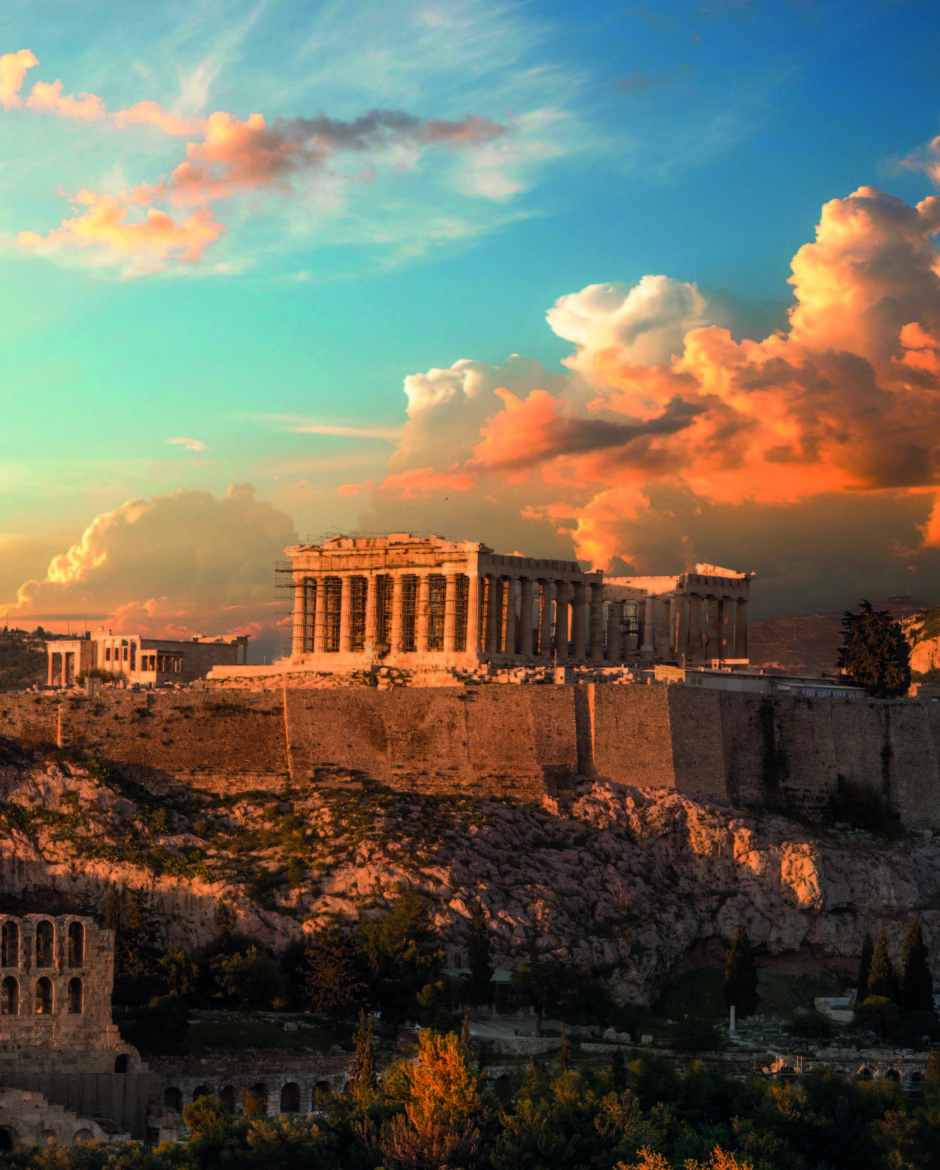Message to the Modern World
THE FRONT COVER shows a ruined temple, which many people believe to be the most perfect building in the world. It’s the Parthenon in Athens. It’s not very big and it looks quite simple. But one of the secrets of its extraordinary beauty is the highly sophisticated system of ‘optical correction’ which is built into its every part.

It’s said that there are no straight lines in the Parthenon. The columns bulge very slightly in the middle, because if they didn’t they’d look too thin. All the 69 columns are leaning very slightly inwards, because if they were absolutely vertical they’d look as though they’re leaning out; the base and the lintels are very slightly bowed, so they look straight. The design of this simple building shows astonishing geometrical expertise. Not to mention the technical brilliance of the stone carving throughout, which matches in quality anything that could be produced even with today’s technology.
The Speech on Mars Hill
The Parthenon was already 500 years old when the
apostle Paul gave his speech in its shadow, which is recorded in Acts
chapter 17.
Paul had arrived in the magnificent city of Athens, and been disturbed by the fact that it was filled with shrines and temples to all kinds of gods. As was his custom, he had set about preaching the Gospel. Athens was a place where people liked hearing new ideas, so it wasn’t long before he was summoned to the Areopagus—the ancient court where the city’s leaders could hear what he had to say.
Paul got straight to the point:
God, who made the world and everything in it, since He is Lord of heaven and earth, does not dwell in temples made with hands. Nor is He worshipped with men’s hands, as though He needed anything (Acts 17:24–25).
This was a direct affront to the culture of Athens, where for centuries many of the best craftsmen in the world had dedicated their lives to creating all kinds of art and architecture to please its many gods. Paul went on:
Therefore, since we are the offspring of God, we ought not to think that the Divine Nature is like gold or silver or stone, something shaped by art and man’s devising (v. 29).
The Parthenon was the temple of the city’s principal goddess, Athena, whose huge ivory and gold statue sat in splendour in its inner sanctum, and Paul had just dismissed her and all her fellow gods as frauds. This was outrageous. Possibly there was indignant muttering at this point in the audience, but they let him continue:
Truly, these times of ignorance God overlooked, but now commands all men everywhere to repent, because He has appointed a day on which He will judge the world in righteousness by the man whom He has ordained. He has given assurance of this to all by raising him from the dead (v. 30–31).
The Parthenon and the other magnificent edifices of Athens had been built during the hey-day of Greek civilisation, when in many ways the foundations were laid for the modern world. It was the Greeks who invented democracy, logic, and the modern scientific method; the Greeks produced some of the finest philosophers, artists and writers the world has ever seen. Paul dismissed all this as ‘times of ignorance’. When they were doing all this, they didn’t know any better. However, now Paul had arrived and he was preaching the Gospel to them, so they must lay it all aside and sit up and take notice of what really matters.
The Message
Paul’s message to them was this: they must repent—that is, acknowledge that the lives they were leading were wrong in God’s eyes, and turn around. Why? Because there will be a Judgement, in which they will answer for what they have done with their lives. How could they know this was true? Because Jesus Christ was risen from the dead.
You could call this a summary of the Gospel which Paul and his fellow apostles taught: the reality of the resurrection of Christ, the certainty of his return to establish his Kingdom, and the urgency of the call to action which results from this.
What was the reaction of Paul’s audience?
And when they heard of the resurrection of the dead, some mocked, while others said, “We will hear you again on this matter.” So Paul departed from among them. However, some men joined him and believed (v. 32–34).
No doubt we only have a summary here of the discussion that went on that day in the Areopagus. There were a few who recognised the truth of what he said, and acted on it. Most didn’t want to know. And down through the centuries this has generally been the response to the preaching of the Gospel.
The 21st Century is very much like ancient Greece in some respects. It is sophisticated, clever, very proud of itself, and filled with all kinds of ‘idols’—that is, objects and pleasures to which people devote themselves.
The message Paul gave to the Athenians is as urgent today as it was then: God “commands all men everywhere to repent, because He has appointed a day on which He will judge the world in righteousness”.

